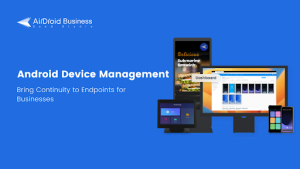Every organization needs mobile devices to meet business requirements and a management system to control these devices for better productivity, for example, mobile phones, tablets, POS terminals, PDAs, rugged devices, and interactive kiosks. Enterprises should have devices with the same OS to overcome compatibility issues and a single management system to reduce costs. All business operations and security are dependent on the management solution, so it is crucial to choose an MDM that provides high-level security and complete device visibility from a central dashboard.
AirDroid Business MDM is a potential solution for Android device management, as it allows businesses to remotely enroll unlimited devices into the system and manage each device with low costs.
Why does an organization need to manage Android devices?
There are various reasons for businesses to manage Android devices. All these significant reasons directly impact business productivity and growth.
- Security and Data protection
Security has always been the primary concern for every organization. It is very hard to manage a large fleet of devices manually. So, most of the businesses rely on management solutions to control the security and management of devices.
- Efficiency and Productivity
Businesses need to develop a restricted environment where employees can use mobile devices only for official purposes. Unlimited access to devices can lead to a decrease in productivity because employees will misuse the devices for unnecessary activities.
- Scalability and Centralized management
Incorporating different management solutions after some years of business growth increases costs. So, businesses need an MDM solution that is highly scalable and can help them manage a large fleet of devices from a single location for immediate action.
- Cost savings
Remote monitoring and control of enrolled devices help businesses reduce costs. Troubleshooting issues remotely reduces the costs of traveling and physical maintenance. One or two technical persons are enough to manage massive devices operating at multiple workstations within the company.
- Device tracking and Inventory management
Businesses need management solutions to track their fleet of devices remotely, check the location history, and find lost devices. Management solutions help retailers and other businesses manage their inventory efficiently and get exact values.
What features does the Android device management solution have?
While choosing an MDM solution for your company, please ensure that the software has the following characteristics:
- Remote device monitoring and control capabilities
An MDM solution must have the ability to help businesses with remote monitoring and control features. These features help administrators monitor the real-time activities of all devices and perform instant actions remotely, like device lockdowns and remote troubleshooting.
- Application management
Application management provides test releases and app restrictions that allow access to safe applications only.
- Security and Compliance
An MDM solution needs to have customizable security features so that different businesses can manage the security and comply with their specific industry standards. Security features also prevent malicious content from entering into the devices and cause a breach of data.
- Integration with existing IT infrastructure and systems
Choose an MDM solution that does not affect your already existing system and easily integrates with other IT devices. It helps businesses to optimize costs and efficiently perform business operations.
What do you need to take into consideration?
- Compatibility and Ease of Use
MDM solution must be user-friendly and intuitive so anyone can use it. You must consider the compatibility of the software before purchasing; otherwise, it will not support your business devices.
- Security and Data Protection
Check the list of security features and data protection measures that MDM software provides. It must have important security features like data encryption, password input policies, multi-factor authentication, remote wipe, remote lockdown, app restrictions, kiosk mode, and web filtering.
- Support and Customer Service
Businesses need the assistance of the customer support team when devices are managed using an MDM solution. You must ensure that the software company is highly responsive to its customers in providing support.
- Cost Considerations
An MDM must have flexible pricing so businesses can adjust the packages as per business needs. It must also provide features that can help you optimize costs and automate various tasks.
Explore how AirDroid Business effectively manages Android devices
AirDroid Business is one of the advanced mobile device management solutions for Android devices. It has wide adaptability due to customizable options and ease of enrollment methods. AirDroid Business MDM has flexible pricing depending on business needs, and it also offers a 14-day free trial to understand it before purchasing.

- Remote Monitor and Control
AirDroid Business allows enterprises to remotely monitor each Android device’s activity, including device details and performance indicators. Device monitoring details provide device name, model, network details, battery level, storage capacity, and real-time screen activities. Admins can also access the device camera and control settings for better display. They can also take screenshots of the screen for future use and control the devices to perform various operations.
- Apps Management
With the app management feature of AirDroid Business, admins can remotely install and delete apps on enrolled devices. They can also restrict the employees from installing or uninstalling any app without permission. App management also allows businesses to perform test releases before deploying devices officially.
- Kiosk mode and policy
Kiosk mode enables enterprises to apply single-app or multi-app restrictions. It helps them restrict devices to one or specific applications and make devices work-oriented. The policy and kiosk feature of AirDroid Business helps admins manage and customize settings on devices. It includes device management, network settings, Bluetooth and tethering, password management, and app allowlist and blocklist.
- Location & geofencing
AirDroid Business helps businesses with location-tracking features. Real-time location tracking helps them monitor employees’ location and history of stays. With geo-fencing, enterprises can restrict some locations that are unsafe and get notifications for immediate actions when devices reach such areas. Admins can remotely wipe the device data if the device is lost or stolen.
- Workflows & Notifications
Workflows help businesses trigger auto-actions when geo-fence alerts are received on devices. With AirDroid Business, admins can assign groups to apply workflows. Various actions are triggered, including device lockdown, factory reset, and switching kiosk config file.
Admins can also utilize the force reading feature of AirDroid Business to ensure the employees have read the notification.
- Bulk file transfer
AirDroid Business ensures smooth and safest file sharing using TSL encryption of data. Admins can copy, paste, or delete files from a device remotely and share multiple files to different devices simultaneously. It allows two-way file transfer without the need for any physical cable.
Conclusion
There are various reasons for enterprises to manage and secure their devices with an MDM solution that needs to be compatible with their device’s OS. Businesses need management systems to enhance security and control device usage by employees. AirDroid Business is an affordable MDM solution for Android devices that fulfills all business needs to manage a fleet of devices. It offers three packages for different business levels, including basic with a cost of $12, standard with a cost of $21, and enterprise package with a cost of $33. These prices comprise only one device per year. So, prices are adjusted with the number of devices.





